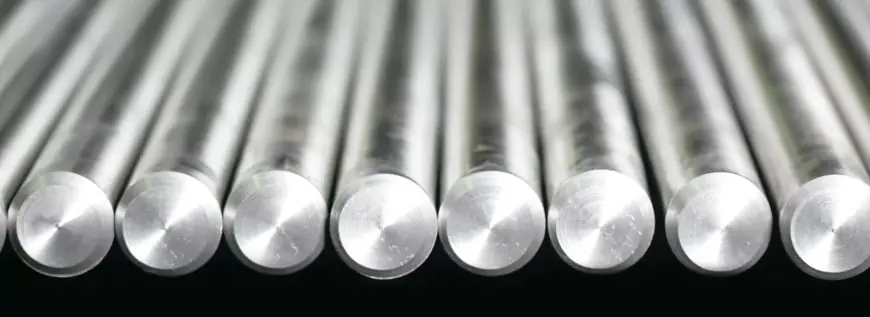Aluminium Bars Uses Properties and Benefits in Industry
Discover aluminium bars, their properties, types, and wide industrial uses. Learn why aluminium bars are strong, lightweight, and essential in modern engineering.

Aluminium has earned its reputation as one of the most versatile metals in the modern world. It is lightweight, corrosion-resistant, and strong enough to withstand heavy loads. Among its many forms, aluminium bars are some of the most widely used due to their adaptability and cost-effectiveness.
From construction and transportation to electrical and marine industries, aluminium bars are present in countless applications. In this blog, we will explore what aluminium bars are, their properties, different types, advantages, and key applications that make them an essential material in today’s industries.
What Are Aluminium Bars?
Aluminium bars are solid pieces of aluminium metal available in multiple shapes, such as round, square, flat, and hexagonal. They are produced through extrusion or rolling processes and are manufactured in a wide range of grades.
Their lightweight yet strong composition makes them an excellent choice for industries that demand efficiency without compromising durability. Whether used in large infrastructure projects or small machine parts, aluminium bars provide reliability and performance.
Properties of Aluminium Bars
The demand for aluminium bars comes from their excellent material properties:
-
Lightweight – Only about one-third the weight of steel, making handling and transportation easier.
-
High Strength – Strong enough for structural use while remaining lightweight.
-
Corrosion Resistance – Naturally forms a protective oxide layer, protecting against rust.
-
Thermal and Electrical Conductivity – Conducts heat and electricity efficiently.
-
Non-Magnetic and Non-Sparking – Safe for sensitive electrical applications.
-
Recyclable and Sustainable – Aluminium can be recycled indefinitely without losing quality.
Types of Aluminium Bars
Aluminium bars come in different shapes to meet the needs of various industries:
1. Aluminium Round Bars
-
Cylindrical shape.
-
Used in aerospace, automotive, and manufacturing industries.
2. Aluminium Square Bars
-
Four-sided solid profile.
-
Ideal for frameworks, supports, and construction projects.
3. Aluminium Flat Bars
-
Rectangular cross-section.
-
Common in transport, construction, and architectural applications.
4. Aluminium Hex Bars
-
Six-sided design.
-
Suitable for mechanical parts and machine components.
5. Custom Bars
-
Made to order for industries such as defense, marine, and electronics.
Popular Grades of Aluminium Bars
Different grades are used based on the specific application:
-
6061 Aluminium Bars – Strong, corrosion-resistant, and easy to machine; used in aerospace and marine.
-
6063 Aluminium Bars – Smooth finish and corrosion resistance; used in decorative and architectural projects.
-
6082 Aluminium Bars – High strength; used in construction and load-bearing applications.
-
2014 Aluminium Bars – Durable and strong; used in aerospace and defense industries.
-
7075 Aluminium Bars – Known for toughness and hardness; ideal for aircraft and military-grade equipment.
Advantages of Aluminium Bars
Aluminium bars offer several advantages compared to other materials:
-
Reduced Weight in Structures – Improves efficiency in transport and construction.
-
Durability – Corrosion resistance ensures longer lifespan.
-
Versatility – Can be cut, welded, and shaped easily.
-
Eco-Friendly – 100% recyclable, reducing environmental impact.
-
Cost Savings – Affordable compared to metals like copper or titanium.
-
Aesthetic Appeal – Can be polished or anodized for modern designs.
Applications of Aluminium Bars
Aluminium bars have applications across a wide variety of industries:
1. Construction and Architecture
-
Frameworks, roofing, bridges, and support structures.
-
Decorative uses in railings, doors, and windows.
2. Automotive Industry
-
Engine components, chassis, and body frames.
-
Reduces vehicle weight, improving fuel efficiency.
3. Aerospace Industry
-
Aircraft structures, landing gear, and engine parts.
-
Relies on aluminium for strength-to-weight efficiency.
4. Marine Industry
-
Shipbuilding, offshore structures, and components exposed to saltwater.
-
Corrosion resistance is crucial for marine durability.
5. Electrical Applications
-
Used in bus bars, connectors, and conductors.
-
High electrical conductivity ensures efficiency.
6. Consumer and Decorative Products
-
Found in furniture, appliances, and kitchenware.
-
Used in interior design for modern aesthetics.
How to Choose the Right Aluminium Bar
When selecting aluminium bars, keep these factors in mind:
-
Application Requirements – Whether structural, decorative, or electrical.
-
Grade Selection – Different grades offer varied strength, machinability, and corrosion resistance.
-
Environmental Conditions – Harsh or marine environments require specific alloys.
-
Machinability – Choose alloys that are easy to machine or weld.
Future Demand for Aluminium Bars
With the global shift towards sustainable and lightweight materials, aluminium bars are expected to see continued growth. The rise of electric vehicles, renewable energy, aerospace projects, and construction innovations will further drive demand.
Advancements in aluminium alloys will make bars stronger, lighter, and even more durable, keeping them relevant for future industrial needs.
Conclusion
Aluminium bars are more than just structural components—they are an integral part of industries worldwide. Their lightweight, durability, corrosion resistance, and recyclability make them a preferred material for construction, aerospace, automotive, marine, and electrical applications.
By choosing the right grade and type, aluminium bars can provide unmatched efficiency, long-lasting performance, and sustainability. As industries continue to innovate, aluminium bars will remain one of the most reliable and versatile materials in modern engineering.
What's Your Reaction?
 Like
0
Like
0
 Dislike
0
Dislike
0
 Love
0
Love
0
 Funny
0
Funny
0
 Angry
0
Angry
0
 Sad
0
Sad
0
 Wow
0
Wow
0
















































